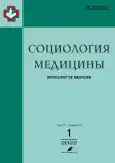The impact of the COVID-19 pandemic on the attitude of russians to their health: a sociological analysis
- Authors: Ivakhnenko G.A.1
-
Affiliations:
- Federal Research Sociological Center
- Issue: Vol 21, No 1 (2022)
- Pages: 109-116
- Section: COVID-19
- URL: https://rjsocmed.com/1728-2810/article/view/109658
- DOI: https://doi.org/10.17816/socm109658
- ID: 109658
Cite item
Abstract
The main goal of the article is to identify how the attitude toward their health among Russians has changed during the COVID-19 pandemic. The article systematizes the results of research analysis devoted to the study of this topic and shows that the pandemic has elevated the issue of health to the top of those issues that have been worrying Russians for the past two years and that more than half of the Russian population has become more attentive to the state of their body, particularly the epidemic’s severity among older people. However, the pandemic in Russia shifted the focus from the widespread care of the population about itself to observing hygienic measures and social distance, and the level of people’s frivolous attitude to their well-being with selfishness in relation to other people. The article also considers the negative consequences of COVID-19 (increased use of alcohol, a change in the diet, constant wearing of masks, etc.) on the health of Russians.
Keywords
Full Text
About the authors
Galina A. Ivakhnenko
Federal Research Sociological Center
Author for correspondence.
Email: ga-ivachnenco@yandex.ru
ORCID iD: 0000-0003-0343-5934
SPIN-code: 5441-4116
MD, Cand. Sci. (Sociol.)
Russian Federation, MoscowReferences
- Pandemic COVID-19 [Internet]. Wikipedia [cited 4 October 2022]. Available from: https://ru.wikipedia.org/wiki/%D0%9F%D0%B0%D0%BD%D0%B4%D0%B5%D0%BC%D0%B8%D1%8F_COVID-19 (In Russ).
- Zhuravleva IV. Otnoshenie k zdorov’yu individa i obshchestva. Moscow: Nauka; 2006. (In Russ).
- Osipov GV, editor. Rabochaya kniga sotsiologa. Moscow: Nauka; 1983. (In Russ).
- Chetverikova A. Sotsiologi uznali mnenie rossiyan o posledstviyakh koronavirusa [Internet]. Rossiiskaya gazeta [cited 4 October 2022]. Available from: https://rg.ru/2020/11/05/sociologi-uznali-mnenie-rossiian-o-posledstviiah-koronavirusa.html (In Russ).
- Reshetnikov AV, Prisyazhnaya NV, Pavlov SV, Vyatkina NY. Social mood of the residents of Moscow city at the beginning of the novel coronavirus pandemic (COVID-19): possibilities of medical and sociological analysis. Sociology of Medicine. 2020;19(1):78–88. (In Russ). doi: 10.17816/1728-2810-2020-19-1-78-88
- Velikaya NM, Belova NI. Socio-Economical Risks of the Pandemic Period and Practices to Overcome Them: Governments’ Policies and Citizens’ Strategies. Logos et Praxis. 2021;20(1):78–88. (In Russ). doi: 10.15688/lp.jvolsu.2021.1.9
- Issledovanie: kak pandemiya vnesla korrektivy v otnoshenie k zdorov’yu [Internet]. Bayer [cited 4 October 2022]. Available from: https://www.bayer.ru/ru/news/20211012-pandemia (In Russ).
- Tolpygina SN, Martsevich SYu, Kontsevaya AV, Drapkina OM. Responsible health-care — the fundamental principles and place in the modern Russian healthcare system. Rational Pharmacotherapy in Cardiology. 2018;14(1):101–110. (In Russ). doi: 10.20996/1819-6446-2018-14-1-101-110
- «Romir»: 53% rossiyan izmenili otnoshenie k svoemu zdorov’yu iz-za vspyshki koronavirusa [Internet]. Kommersant [cited 4 October 2022]. Available from: https://www.kommersant.ru/doc/4824937 (In Russ).
- glavnykh posledstvii COVID-19 dlya nashego obshchestva [Internet]. RBK [cited 4 October 2022]. Available from: https://trends.rbc.ru/trends/social/5fa195429a794721ab1f7d29 (In Russ).
- Chumikov AN. Social and communication mechanisms of adaptation of the population to the crisis conditions of the pandemic in the all-Russian, regional and sectoral context. Sociologicheskaja nauka i social’naja praktika. 2022;10(1):7–23 (In Russ). doi: 10.19181/snsp.2022.10.1.8858
- Lippi G, Henry BM, Bovo C, Sanchis-Gomar F. Health risks and potential remedies during prolonged lockdowns for coronavirus disease 2019 (COVID-19). Diagnosis (Berl). 2020;7(2):85–90. doi: 10.1515/dx-2020-0041
- Kostarnova N. Vozdushno-kapel’naya trevoga. Kazhdyi tretii zhitel’ Rossii v 2020 godu zhalovalsya na simptomy depressii [Internet]. Kommersant [cited 4 October 2022]. Available from: https://www.kommersant.ru/doc/4628233 (In Russ).
- Mingazov S. Chislo obrashchenii k psikhiatram i psikhologam vyroslo v Rossii v pandemiyu [Internet]. Forbes [cited 4 October 2022]. Available from: https://www.forbes.ru/newsroom/obshchestvo/421821-chislo-obrashcheniy-k-psihiatram-i-psihologam-vyroslo-v-rossii-v (In Russ).
- Abramov K. Vliyanie pandemii na rossiiskoe obshchestvo v razreze dannykh VTsIOM [Internet]. VTsIOM [cited 4 October 2022]. Available from: https://wciom.ru/fileadmin/user_upload/presentations/2021/Forum_regiony_Abramov.pdf (In Russ).
- Aronov PV. Problema sokhraneniya zdorov’ya i rabotosposobnosti lyudei v usloviyakh pandemii COVID-19 [Internet]. Klinika «Semeinyi doktor» [cited 4 October 2022]. Available from: https://familydoctor.ru/about/publications/psikhiatriya/problema_zdorovya__covid_19.html (In Russ).
- Mettini E. Disease and fear as elements of pandemic. Sociology of Medicine. 2021;20(1):43–48. (In Russ). doi: 10.17816/1728-2810-20-1-45
- Lippi G, Mattiuzzi C, Favaloro EJ. E-thrombosis epidemiology, physiopathology and rationale for preventing computer-related thrombosis. Ann Transl Med. 2018;6(17):344. doi: 10.21037/atm.2018.09.03
- Kislitsyna OA. Long-term adverse effects of the COVID-19 pandemic on population health. Social’nye aspekty zdorov’a naselenia / Social aspects of population health [serial online]. 2021;67(4):2. (In Russ). doi: 10.21045/2071-5021-2021-67-4-2
- Grossman ER, Benjamin-Neelon SE, Sonnenschein S. Alcohol during the COVID-19 Pandemic. A Cross-Sectional Survey of US Adults. Int J Environ Res Public Health. 2020;17(24):9189. doi: 10.3390/ijerph17249189
- Nemtsov AV, Gridin RV. Indirect indicators of alcohol consumption during the coronavirus epidemic in Russia. Voprosy narkologii. 2020;193(10):16–33. (In Russ). doi: 10.47877/0234-0623_2020_10_16
- GBD 2016 Alcohol Collaborators. Alcohol use and burden for 195 countries and territories, 1990–2016: a systematic analysis for the Global Berden of Disease Study 2016. Lancet. 2018;392(10152):1015–1035. doi: 10.1016/S0140-6736(18)31310-2. Erratum in: Lancet. 2018;392(10153):1116. Erratum in: Lancet. 2019;393(10190):e44.
- Koronavirus menyaet povsednevnye praktiki rossiyan [Internet]. VTsIOM [cited 4 October 2022]. Available from: https://wciom.ru/analytical-reviews/analiticheskii-obzor/koronavirus-menyaet-povsednevnye-praktiki-rossiyan (In Russ).
Supplementary files







